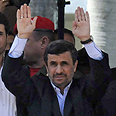
US targets companies accused of evading Iran sanctions
Treasury Department blacklists Iranian businessman, network of firms it says moved billions of dollars on behalf of Iran regime, including tens of millions to Revolutionary Guard Corps. 'Iran has resorted to criminal money laundering techniques,' official says
The United States on Thursday slapped financial penalties on an Iranian businessman, a Malaysian bank and a network of companies it accused of attempting to evade international sanctions on Iran's nuclear program through money laundering.
The Treasury Department blacklisted Babak Zanjani and First Islamic Investment Bank for providing financial and other support to the National Iranian Oil Company.
Related stories:
- Sanctions push Iran inflation above 30%
- Top US commander: Iran sanctions not working
- Iran sanctions spur boom for Pakistani smugglers
It said Zanjani and a network of companies had moved billions of dollars on behalf of the Iranian government, including tens of millions of dollars to an engineering unit of the Islamic Revolutionary Guard Corps.
"As international sanctions have become increasingly stifling, Iran has resorted to criminal money laundering techniques, moving its oil and money under false names and pretenses," said David S. Cohen, under secretary for terrorism and financial intelligence at Treasury.
The measures are the latest by Washington to crack down on Iran's nuclear program. US and European sanctions on Iran's oil industry aim to choke funding for its nuclear program, which the West says is being used to develop weapons. Iran says the program is for civilian purposes.
The sanctions have slashed Iran's oil exports, devalued its currency, and pushed up inflation.

Revolutionary Guard Corps naval drill (Archive photo: AP)
Based in the United Arab Emirates, Zanjani is the chairman of the Sorinet Group, a group of companies and banks. He told Reuters late last year his network did not work for Tehran after the European Union forbade companies and individuals from doing Iran-related business with him.
Last month Treasury imposed financial sanctions on Dimitris Cambis, a Greek businessman it said secretly operated a shipping network on behalf of Tehran to evade the oil sanctions.
"Whether through Babak Zanjani, Dimitris Cambis, or tomorrow's chosen accomplice, we will be relentless in exposing and thwarting Iran's attempts to evade international sanctions and abuse the global financial system," Cohen said.
By taking the action against Zanjani, the bank and the network of companies, the Treasury Department prohibited transactions between them and any US citizen and freezes any assets they have under US jurisdiction, it said.
Treasury also blacklisted a Swiss-based Iranian trading company, Naftiran Intertrade Company (NICO), which it said was owned or controlled by the National Iranian Oil Company.
A Treasury official said any global company that does business with NICO is subject to being cut off from trade with the United States, unless it was in a country that has significantly cut purchases of Iranian oil as outlined by the US sanctions.
As talks between Iran and major powers have failed to end the deadlock over its nuclear program, lawmakers in the US Senate are preparing legislation that would place further sanctions on Iran.
Senator Mark Kirk, a Republican from Illinois, is expected to introduce bipartisan legislation in coming weeks that would broaden sanction on Iran.
The package is expected to target a range of Iranian government officials for human rights sanctions, including global travel bans and personal asset seizures, a congressional aide said.
The legislation would impose a de facto arms embargo on Iran, North Korea, Syria, Sudan. It would also close loopholes in existing sanctions including Iran's access to foreign exchange reserves, money exchange houses, and vessel-to-vessel oil transfer programs.
Commenting on Thursday's action by Treasury, an academic said further sanctions and diplomacy may be required to persuade Iran to stop its nuclear program.
"Every bit helps, but it seems unlikely that this straw will be the one that breaks the camel's back for Iran's nuclear program," said Jeff Colgan, a professor at American University in Washington who studies the geopolitics of oil.
- Receive Ynetnews updates directly to your desktop










